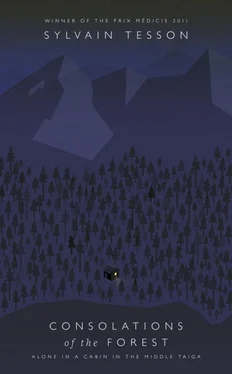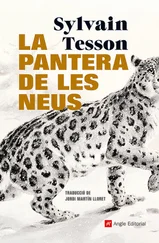Lichen hangs from the trees. Long ago I read a tale in which the author imagined a god who roamed the understorey of the forest, where his coat would catch on branches, leaving shreds that became lichen.
The sadness of the pines: they look cold. After an hour of climbing, I check my altimeter: 2,461 feet. Another effort, and beyond about 2,950 feet the forest will lay down its weapons. Up there, snow polished by tempests presents a hard surface. The snowshoes grip well; I progress quickly and choose to go up one of the narrow valleys. A few larches survive beyond the timber line. They are solitary here, with contorted branches that stand out against the blue background of Baikal, starred with fractures. The gold branches, the lapis lazuli of the lake, the white, crazed ice: the palette of the Japanese artist Hokusai.
Sometimes the ground gives way. The snow, mounded over a thicket of dwarf pines, collapses beneath my weight, dumping me into a net of branches where my snowshoes get caught in the tangles. I curse fiercely down in my hole. In Kolyma Tales , Varlam Shalamov, a former prisoner in a gulag in Siberia, remembers the dwarf pines that surrounded the camp. When the temperature moderated in May, the trees would free themselves from their blanket of snow: standing up straight again, they were harbingers of spring, and hope.
At an altitude of 3,280 feet, I climb towards the rocky crests that flank the thalweg, that line connecting the lowest points along the length of a valley. Looking down, I see ridges serrated like dorsal fins against the lake. Some of my friends live for this alone: gaining altitudes where the odourless air stings the nose, where life hangs between earth and sky in a realm of abstract forms. When they descend into the valleys once again, they find that life smells bad. Mountaineers are unhappy in cities.
Among the boulders that protrude above the snow, I build a fire to make tea. Side by side, we smoke, the fire and I, offering our spiralling fragrant curls to the ancient lake. During such days up here, I dedicate myself to the pure joy of being: taking a drag, alone, high above the lake; hurting nothing, taking orders from no one, desiring no more than what I experience and knowing that nature does not reject us. In life, three ingredients are necessary: sunshine, a commanding view and legs aching with remembered effort. Plus some little Montecristos. Happiness is as fleeting as a puff of cigar smoke.
It’s −22°F. Too chilly for more contemplation. I select a couloir in which to slide down again, braking by grabbing at ash saplings and dogwood branches. Back in the forest of pines and birches, I plunge into the slumbering snow, take a guess as to the appropriate heading, and regain the lakeshore in an hour, winding up not far from the cabin. When I see it again, I feel welcome and go happily home. I close the door and light the stove. In May, I simply must climb all the way to the summits of my domain.
Hölderlin’s epigraph for Hyperion, or, The Hermit in Greece is taken from the epitaph on the tombstone of St Ignatius of Loyola: Not to be confined by the greatest, yet to be contained within the smallest, is divine. In short, after an outing, after gorging on the grandeur of the lake, remember to give a little wink to a small servant of beauty: a snowflake, some lichen, a tit.
4 MARCH
The sun’s caress on the window pane approaches the sensual delight in the touch of a loved one’s hand. When you’re off playing hermit in the woods, only the sun is allowed to intrude.
To get the day off to a good start, it’s important to remember one’s duties. In order: greetings to the sun, the lake, the little cedar growing in front of the cabin and on which, every evening, the moon hangs up its lantern.
I live here in the realm of predictability. Each day goes by, a mirror of the one before, a rough draft of the one to come. The passing hours bring variations in the sky’s coloration, the comings and goings of the birds, and a thousand almost imperceptible things. When the world of men goes silent, a fresh tint in the feathery foliage of the cedars or a glinting reflection off the snow becomes a considerable event. I will no longer look down on folks who discuss the rain and sunny skies. Talk about the weather has a cosmic dimension. The subject is no less profound than a debate about Salafist militants infiltrating Pakistani intelligence agencies.
What is unexpected in the lives of hermits is their thoughts, which alone interrupt the course of monotonous hours. To surprise yourself, you must dream.
I remember when I embarked, two years ago, on board the Jeanne d’Arc , a training vessel of the French navy. We were returning from Suez, moving slowly through the Mediterranean. Islands and capes drifted by, watched in silence by officers up on the bridge, all rejoicing inside to see each fresh nuance appear in the coastline. Today, I look out of my window with the same watchfulness as I did aboard the Jeanne , attentive now to the shifting shadows and trembling light instead of to changes ashore. Up on the bridge, we asked movement in space to provide us with distraction, while in the cabin, time’s tiny precipitations are enough. Immobile, becalmed, I sail on. If anyone asks me what I did during my months here, I will reply: ‘I went on a cruise.’
Inside and outside the cabin, the feeling of time’s passage is not the same. Indoors: a rippling of cosy hours. Outdoors: −22°F, the slap of every second. On the ice, the hours drag. The cold numbs their flow. So, the threshold of my door is not a wooden slat separating heat from cold and comfort from hostility, but a throttle valve connecting the two halves of an hourglass in which time does not pass at the same speed.
A Siberian cabin is not built to the specifications of the civilized world. Here there are no requirements for security, government assistance, insurance. Russians make a point of never taking precautions. Within a space of ninety-seven square feet, the body moves among the searingly hot stove, the saw hanging from a rafter, the knives and axes planted in the beams. In the Europe of Safety First, these cabins would be razed.
I spend the afternoon sawing up a cedar trunk. Chain-gang work: the wood is dense, the metal teeth don’t bite well. A glance towards the south, to catch my breath. The landscape is at rest, perfect, structured: the grand curve of the bays, the sulphurous streaks in the sky, the stilettos of the pines, the majesty of the granitic drapery. The cabin is at the heart of a tanka poem, in contact with the lacustrine, mountainous and woodland worlds, symbolizing respectively death, the eternal return and divine purity.
The cedar is slender but must be 200 years old: here, what living things lose in abundance they gain in intensity; the trees don’t explode in luxuriant foliage, but their flesh is as hard as marble.
Another pause. Last year, on the flanks of the Samarga valley in the Russian Far East, I visited some lumberjack camps. Moscow is selling its taiga to the Chinese. Chainsaws lacerate the silence around the camps, dismembering the forest acre after acre. The invaders slice up the trunks as meticulously as wood-eating insects. Some of these trees are destined for a strange fate: sprung from the soil of a wilderness valley ridge, having weathered a hundred, maybe a hundred and fifty Siberian winters, these cedars will find themselves chopped into chopsticks condemned to stuff soup noodles down the gullets of Shanghai labourers building a shopping mall for expats. Times are hard for fir trees. Sergei told me that up behind the rocky ridges flanking Baikal, deep in the Baikal-Lena Nature Reserve, lumberjacks are already at work.
Russians, so proud of the integrity of their national territory, pay no attention to this underhanded plot. Puffed up with the illusion of living in a limitless country, they imagine their nature to be inexhaustible. One becomes an ecologist faster in the patchwork mountain pastures of the Swiss Alps than dying of angst in the vastness of the Russian plains.
Читать дальше












